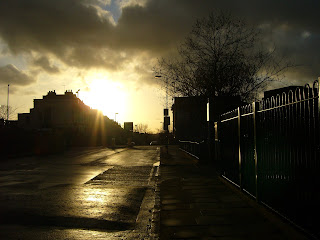
Aquí en Inglaterra, una hora menos.
-
(What´s the time?)
Here in England, one hour less.




El Circuito cerrado de televisión o su traducción anglosajona Closed Circuit Television (CCTV), es una tecnología de video vigilancia visual diseñada para supervisar una diversidad de ambientes y actividades. Se le denomina circuito cerrado ya que, al contrario de lo que pasa con la difusión, todos sus componentes están enlazados. Además, a diferencia de la televisión, este es un sistema pensado para un número limitado de espectadores.
Según estudios realizados en Londres, una persona que viva en la ciudad puede ser grabada unas 300 veces diarias. Este sistema funciona con la finalidad de preservar la seguridad en sus calles, y sobre todo, velar por la seguridad de sus ciudadanos.

A continuación adjunto una noticia un tanto curiosa que me ha hecho reír esta mañana, y de paso, recordar una película excelente: `Contraté a un asesino a sueldo´, de Aki Kaurismaki.
Pensilvania, agosto de 2003. Dos hombres y una mujer, Marjorie Diehl-Armstrong, planean el atraco a un banco. Uno de ellos es elegido para dar la cara: Brian Wells, repartidor de pizzas. Deberá ir a la sucursal que planean asaltar y volver con el dinero. Todo con una macabra peculiaridad: llevar una bomba atada a su cuello. Los tres están de acuerdo.
Wells se ata la bomba en la parte superior del pecho y se dirige al banco. Debe hacer bien el trabajo porque parte del dinero lo va a utilizar Marjorie, la mujer, que entonces tenía 54 años, para pagar al hombre que debe matar a su padre. El futuro asesino a sueldo es Kenneth E. Barnes, de 53 años, el tercero en discordia. Lo que Wells no sabe es que sus compañeros van a traicionarle. El explosivo que lleva no es falso, como han acordado.
Cuando sale del banco, la policía le está esperando y Wells, atemorizado, se inventa la versión que hasta esta semana se ha tomado como oficial: los verdaderos atracadores le han secuestrado. Se da cuenta de que no tiene salida y cuenta a los agentes que dos personas le han obligado a llevar la bomba y le han amenazado con explotarla si no roba el dinero para ellos. La policía, alertada ante la posible explosión del artefacto, que sobresale por la camiseta gris de Wells, solicita la presencia del equipo de artificieros, que no llega a tiempo. La bomba explota. Wells fallece en el instante y su versión queda como la verdadera.
Hasta ayer, día en que las autoridades federales estadounidenses, según han informado la cadena de televisión estadounidense CNN y el diario Erie Times-News de Pensilvania, formularon la acusación definitiva: Wells actuó como uno más de la banda, y planeó y ejecutó el robo junto con Marjorie, que se ha declarado inocente, y Kenneth E. Barnes, sus cómplices.
Ambos han sido acusados de conspiración, del posterior atraco al banco y de la posesión de un arma (la bomba) en la comisión del delito. Las autoridades federales estadounidenses no descartan, además, la posibilidad de acusar a ambos por el homicidio de Wells.






















Duérmete junto a mí
|